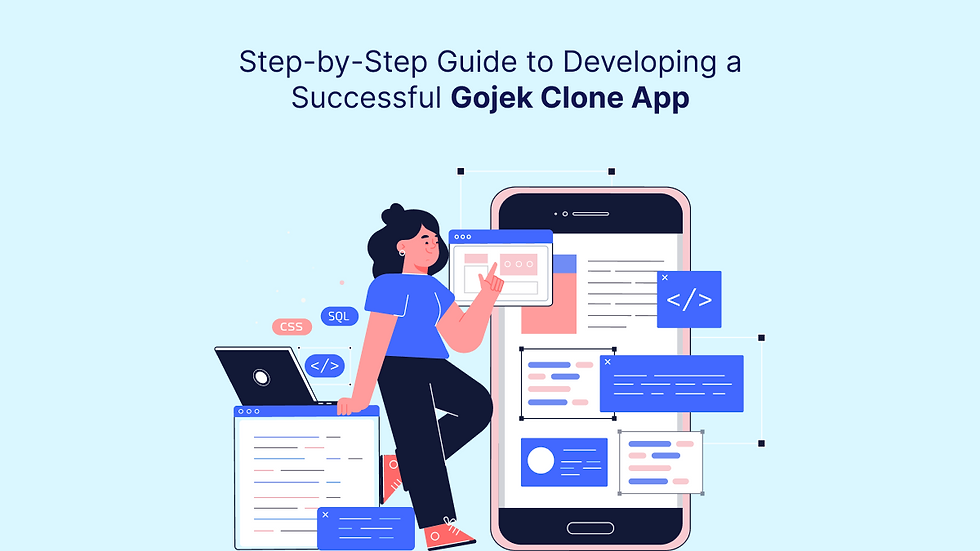Gojek Clone App Development: Build Your Own Multi-Service Platform
- harryclark852
- Sep 29, 2025
- 4 min read

On-demand services have changed the way people access daily needs. From booking rides to ordering groceries and scheduling home cleaning, customers now want everything in one app. Gojek has become a leading example of how a single platform can host multiple services for millions of users. For entrepreneurs and companies aiming to replicate this success, Gojek clone app development provides a fast, cost-effective way to build a multi-service platform without starting from scratch. This guide explains how to develop your own Gojek clone app, the features you should include, monetization strategies, and tips for long-term growth.
Understanding Gojek Clone App Development
What is a Gojek clone app?
A Gojek clone app is a ready-made software solution designed to replicate the functionality of the original Gojek platform. It allows businesses to offer multiple services—ride-hailing, food delivery, courier, and more—under a single application. Using a clone app saves time, reduces costs, and accelerates market entry.
Why multi-service apps are in demand
Customers no longer want to install separate apps for different services. A single app that combines all daily needs offers convenience, faster service, and better user experiences. For businesses, it provides an opportunity to diversify revenue streams and stand out from single-service competitors.
Benefits of Developing a Gojek Clone App
Faster launch
Developing a multi-service platform from scratch can take a year or more. A clone app dramatically shortens development time, enabling you to launch in weeks after customization.
Cost efficiency
Building separate apps for each service requires significant investment. A Gojek clone app combines all services into one platform, reducing development and maintenance costs.
Scalability
A high-quality clone app can handle thousands of users and service providers simultaneously. It also allows you to add new services as your business grows.
Proven business model
Gojek’s success demonstrates that multi-service apps can attract large user bases. Using a similar model increases your chances of success.
Key Features to Include in a Gojek Clone App
User-friendly interface
Customers should be able to navigate the app easily, search for services quickly, and complete bookings without confusion.
Multiple services integration
Offer services such as ride-hailing, food delivery, grocery delivery, courier, and home cleaning all in one app.
Real-time tracking
Allow users to track drivers or service providers in real time, view estimated arrival times, and communicate directly within the app.
Secure payment options
Integrate multiple payment gateways, including credit cards, mobile wallets, and cash on delivery, to ensure convenience for all customers.
Ratings and reviews
Let users provide feedback on services. This helps maintain quality standards and improves trust.
Admin dashboard
A comprehensive admin panel allows you to manage users, service providers, transactions, and analytics from one place.
Steps to Develop a Gojek Clone App
Step 1: Define your services
Identify which services you want to include initially. Starting with core services like ride-hailing and delivery is common, then expanding to more offerings over time.
Step 2: Choose the right technology partner
Select a developer or company experienced in Gojek clone app development. Review their portfolio, client feedback, and support policies.
Step 3: Customize your app
Although the base app is ready, customizing it to reflect your brand identity is critical. Adjust the design, features, and workflows to meet your target audience’s expectations.
Step 4: Test thoroughly
Run extensive tests to ensure smooth performance, secure payments, accurate tracking, and bug-free operations before launch.
Step 5: Launch and market your app
After testing, launch your app on app stores and promote it using digital marketing channels like social media, influencer marketing, and search engine optimization.
Monetization Strategies for a Gojek Clone App
Commission-based revenue
Charge service providers a commission on each transaction completed through your app. This is the most common monetization model.
Subscription plans
Offer subscription packages to service providers for premium features, higher visibility, or reduced commission rates.
Delivery or booking fees
Add a small service fee for each booking or delivery made by customers. These microcharges can add up to significant revenue.
In-app advertising
Allow third-party businesses to advertise their services within your app, generating additional income.
Corporate partnerships
Collaborate with companies to offer staff transportation, bulk deliveries, or special discounts, opening a profitable B2B channel.
Challenges You May Face
High competition
The on-demand industry is competitive. Differentiating your app with unique features, better service quality, or attractive pricing is essential.
Service provider retention
Keeping service providers happy with timely payments, fair commissions, and support is crucial for maintaining service quality.
Technology updates
User expectations evolve quickly. Regularly update your app to add new features, improve speed, and enhance security.
Customer acquisition
Gaining users requires a strong marketing strategy, introductory offers, and a focus on building trust through consistent service quality.

Tips for Long-Term Success
Focus on user experience
A smooth, intuitive experience encourages repeat usage and positive reviews.
Build a strong brand identity
Brand recognition increases trust. Invest in good branding, marketing campaigns, and community engagement.
Offer promotions and referral programs
Discounts, loyalty points, and referral incentives help attract new customers and retain existing ones.
Use analytics to improve performance
Track user behavior, service demand, and revenue streams. Data-driven decisions help you scale effectively.
Conclusion
Building your own multi-service platform is no longer out of reach. With Gojek clone app development, entrepreneurs can launch a robust, feature-rich app quickly and cost-effectively. By customizing the app, focusing on service quality, and implementing effective monetization strategies, businesses can compete successfully in the on-demand economy. Entrepreneurs who also consider integrating the keyword uber clone app into their strategy can highlight their ability to offer scalable services similar to major on-demand platforms.
FAQs
What is a Gojek clone app?
It is a pre-built application that replicates the features of Gojek, enabling businesses to launch their own multi-service platform quickly.
How much time does it take to develop a Gojek clone app?
With a ready-made solution, businesses can launch within a few weeks after customization and testing.
Can I customize the features of a Gojek clone app?
Yes. You can modify the design, services, and features to suit your brand and target audience.
How does a Gojek clone app generate revenue?
It earns through commissions, delivery fees, subscriptions, advertising, and corporate partnerships.
Is a Gojek clone app suitable for startups?
Yes. It is an affordable and scalable option for startups wanting to enter the on-demand multi-service market.




Comments